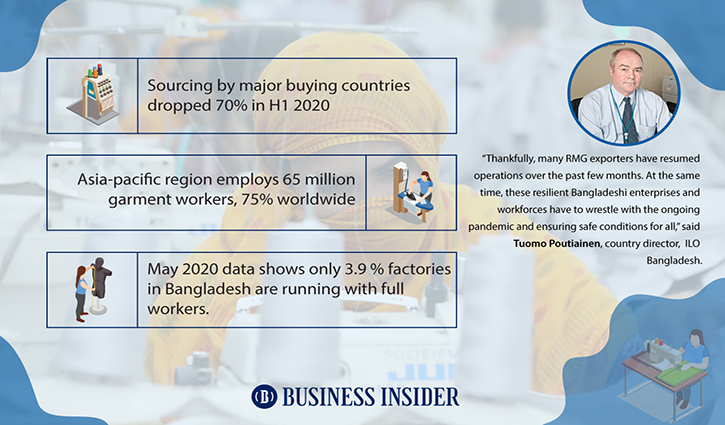Garment industry suffers as Covid-19 hits hard supply chain: ILO
BI Report || BusinessInsider

The Covid-19 crisis has hit the garment sector in the Asia- Pacific region hard, with plummeting retail sales in key export markets affecting workers and enterprises throughout supply chains, according to new research published by the International Labour Organization (ILO) on Wednesday.
The supply chain ripple effect: How Covid-19 is affecting garment workers and factories in Asia and the Pacific assess the impact of the pandemic on supply chains, factories and workers in 10 major garment-producing countries of the region: Bangladesh, Cambodia, China, India, Indonesia, Myanmar, Pakistan, Philippines, Sri Lanka and Viet Nam.
The research highlights that major buying country’s imports from garment-exporting countries in Asia dropped up to 70 percent in the first half of 2020, due to collapsing consumer demand, government lockdown measures, and disruptions to raw material imports necessary for garment production.
As of September 2020, almost half of all jobs in garment supply chains were dependent on demand for garments from consumers living in countries with the most stringent lockdown measures in place, where retail sales have plummeted. The Asia-Pacific region employed an estimated 65 million garment sector workers in 2019, accounting for 75 percent of all garment workers worldwide.
Chihoko Asada Miyakawa, ILO Regional Director for Asia and the Pacific, said: “This research highlights the massive impact Covid-19 has had on the garment industry at every level. It is vital that governments, workers, employers and other industry stakeholders, work together to navigate these unprecedented conditions and help forge a more human-centred future for the industry”.
Throughout the surveyed countries, governments and industry associations have issued ILO supported guidance for minimizing the spread of Covid-19.
Although governments in the region have responded proactively to the crisis, the research reveals the closure of thousands of factories across the region either capacity.
Sample data from May 2020 shows that only 3.9 percent of Bangladeshi suppliers have retained their entire workforce and 43 percent of RMG factories in Bangladesh are operating with less than full capacity. Worker layoffs and dismissals have increased sharply, while factories that have reopened are often operating at reduced workforce.
“Thankfully, many RMG exporters have resumed operations over the past few months. At the same time, these resilient Bangladeshi enterprises and workforces have to wrestle with the ongoing pandemic and ensuring safe conditions for all,” said Tuomo Poutiainen, country director, ILO Bangladesh.
“To this end, the ILO has supported the development of a national Occupational Safety and Health (OSH) guideline on Covid-19 to mitigate infections in workplaces. In addition, several initiatives to protect income, health and employment of RMG workers and support for employers during the pandemic have also been developed,” Poutiainen added.
“The typical garment worker in the region lost out on at least two to four weeks of work and saw only three in five of her co-workers called back to the factory when it reopened. Declines in earnings and delays in wage payments were also common among garment workers still employed in the second quarter of 2020,” said Christian Viegelahn, labour economist at the ILO Regional Office for Asia and the Pacific.
In addition, the research identifies how women, who make up the majority of the workers, have been disproportionately affected by Covid-19, exacerbating existing inequalities in earnings, workload, occupational segregation, and distribution of unpaid care work.
Although the garment sector in Asia is generally marked by low levels of collective bargaining at both sector and factory level, the research notes that social dialogue appears to have helped strengthen crisis responses in countries where dialogue mechanisms are in place. The brief calls for more inclusive and meaningful social dialogue at the national and sectoral level in countries across the region.
Other recommendations highlighted include the need for continued support for enterprises, as well as the extension of social protection for workers and especially women. The recent global ‘Call to Action,’ an international multi-stakeholder initiative facilitated by ILO is also noted as a promising example of industry-wide, solidarity efforts to address the crisis.
The supply chain ripple effect: How Covid-19 is affecting garment workers and factories in Asia and the Pacific is based on extensive desk research and analysis of publicly available and enterprise-level data, together with interviews with leading stakeholders from across the sector in Asia. It was led by Cornell University and an ILO team comprising the Regional Economic and Social Analysis Unit (RESA), Better Work and the ILO-Sida Decent Work in Garment Supply Chains Asia project
























